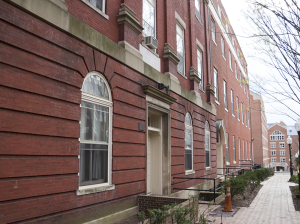
Ryan and Mulledy Halls will be converted into student housing by fall 2015, ensuring that the university can accommodate third-year students.
After considering the possibility in recent weeks, administrators confirmed Wednesday that students beginning with the Class of 2017 will be required to live on campus for three years.
The decision has upset some current freshmen, who think that the policy should be delayed to affect only students who have not yet arrived at Georgetown. The Freshman Class Committee created a Facebook event Thursday entitled “Change 3 Year On-Campus Housing Requirement for Class of 2017,” which had around 160 attendees as of Thursday night.
“When the email came out, it was like a bomb went off,” Freshman Class Committee Vice Chairman Nicky Rault (SFS ’17) said. “Everyone was going crazy that something had happened. The immediate feedback was pretty abrupt that students are not happy with this policy.”
The policy change is part of the university’s efforts to meet the requirements of the 2010 Campus Plan agreement, which obligates the university to move 385 students on campus by fall 2015 and house 90 percent of students on campus by 2025. Other components of these efforts include the renovation of Ryan and Mulledy Halls — the former Jesuit Residence — into dorms, the construction of the Northeast Triangle Residence Hall for fall 2016, the temporary conversion of two floors of the Georgetown University Hotel and Conference Center into dorms for the 2015-2016 academic year and added capacity to existing residence halls.
“One of the campus plan commitments we made was to bring more students back to campus,” Vice President for Student Affairs Todd Olson said. “In our view, the requirement is part of this whole set of changes and enhancements.”
At this time, students are guaranteed only two years of on-campus housing, though most do not run into trouble securing housing for junior year. The new policy will extend that guarantee to three years.
Currently, most juniors live on campus with some choosing to move off campus after only two years in campus housing. Many seniors live off campus, a trend that will not be limited by this policy.
“This is a requirement, but we’re also noting that it’s a guarantee that we’ll provide housing for students for three years,” Olson said.
The three-year requirement will be modified for transfer students so that all sophomore and junior transfers will be free to move off campus for their senior year, even if they have only lived in campus housing for one or two years. Similarly, time spent abroad will count toward a student’s three years in campus housing.
Georgetown University Student Association leaders favored postponing the policy by a year so that it did not affect current freshmen. While they were not successful in persuading administrators to do so, they were able to compromise on certain matters, including the policy’s approach to transfer students and study abroad. GUSA representatives also spoke to administrators about housing options students would prefer under the new policy, pointing to areas like the Leavey Hotel and Conference Center.
“One thing that really informed the approach that we took to this was the student desire for on-campus locations. What we really appreciate is that when we expressed to the university administration that we would prefer options that included Leavey and current residential space,” GUSA President Trevor Tezel (SFS ’15) said.
Despite these considerations, some freshmen still find the new policy limiting. Rault said he felt that the policy is unfair since freshmen were under the impression that they would have the opportunity to live off campus after two years when they enrolled at Georgetown.
“Freshmen have been here for a year. They came here under the impression that they would have the opportunity to live off campus junior and senior year. Especially after this whole year where we saw at our friends’ houses or apartments off campus that this is a very different lifestyle than on campus,” Rault said.
Other students were in favor of postponing the policy for one year.
“I just think that if they want to institute a policy like this, it should definitely be done with a class that’s incoming rather than a class that’s already been here for a year and has seen what the upperclassmen have,” Grace Cole (SFS ’17) said.
Some students said that they felt that the administration neglected the concerns of students when they instituted the new policy.
“They could have just as easily pushed back the plan for one year. It wouldn’t have impacted the plan that much … and everyone would be happy,” Mitchell Tu (SFS ’17) said.
Despite GUSA’s failed efforts to delay the implementation of the housing requirement, the Freshman Class Committee plans to petition the administration to postpone the housing policy so that it begins with the Class of 2018, according to Rault.
“The plan for now is to gather support for the Class of 2017 and then to meet with the appropriate administrators to see if we can compromise on the new policy,” Rault said.














